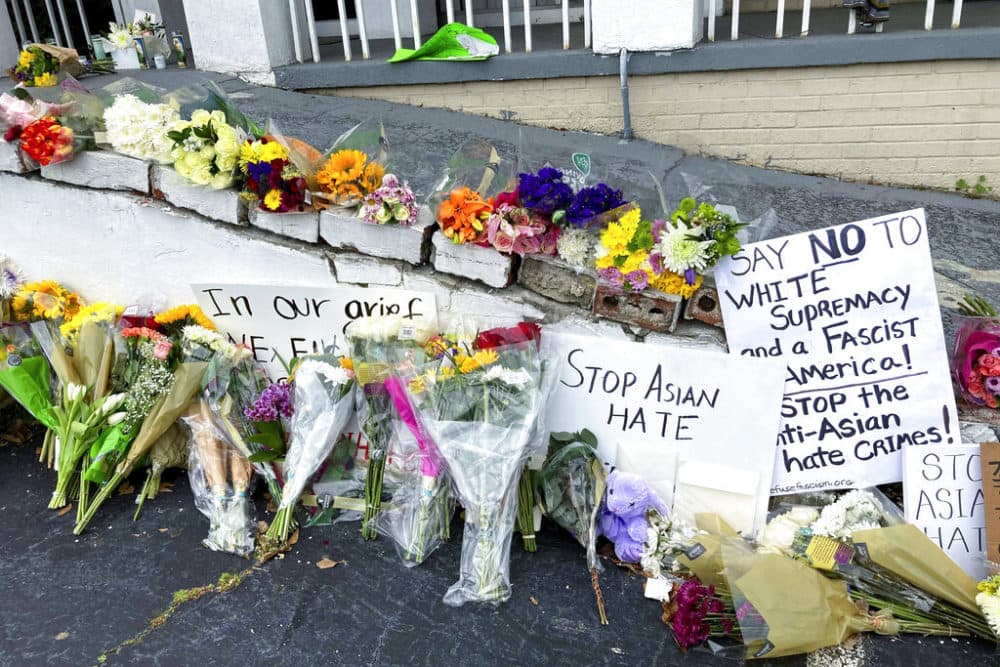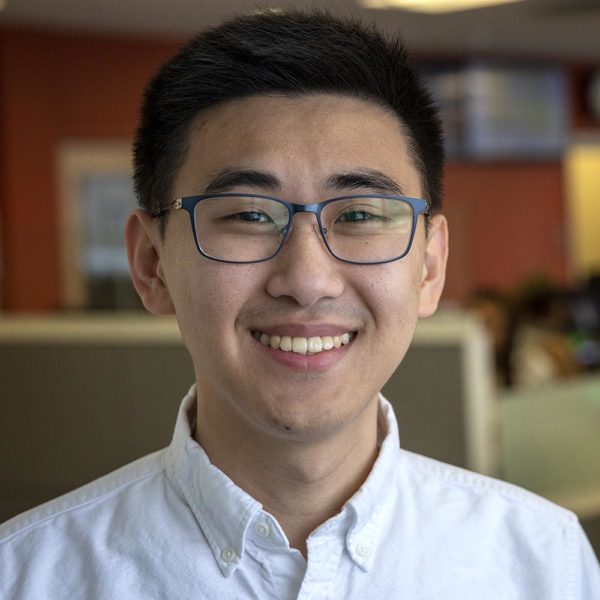Advertisement
What The Georgia Shootings Reveal About Anti-Asian Racism In The U.S.
Resume
Editor's Note: This hour discusses anti-Asian discrimination and violence in the U.S. For more resources you can visit Stop AAPI Hate, Learning for Justice and COVID-19 Resources to Stand Against Racism.
We discuss the connection between rising violence now, and America's history of anti-Asian discrimination.
Guests
Kelly Yang, New York Times best-selling author of "Front Desk" and "Parachutes." (@kellyyanghk)
Doris Chang, clinical psychologist and associate professor at the New York University Silver School of Social Work. (@dorisfchang)
Sung Yeon Choimorrow, executive director of the National Asian Pacific American Women’s Forum. (@schoimorrow)
Also Featured
Christine Liwag Dixon, Filipino-American writer and musician. (@cmliwagdixon)
Interview Highlights
What went through your mind when first heard about the Georgia shootings?
Kelly Yang: “A friend texted me and she said, I'm so sorry about what happened in Atlanta. And I just sort of instinctively knew something bad had happened. But I waited probably like ten minutes before checking the news, just sort of sitting and just sitting in this fear and regret. Just thinking, Oh, my God, what now? Because we've been trying so hard to make everyone aware of what was going on and the staggering rates of hate crimes against Asian Americans. We've been doing everything we could to just try to get people to pay attention. And I just sort of sat there in this dread of, Oh, my God, something horrible. This is it. Something bad must have really happened. And when I saw the news it confirmed just my worst fears.”
“It feels like a double whammy of pain because we've gone through the pain of what happened, which was these Asian women were targeted. You know, it wasn't just anybody. It was these Asian women. This guy specifically went after Asian spas. So when people in the second wave tell us, Well, maybe it wasn't racially motivated, maybe it was a sex addiction, maybe it was this, maybe it was that, he was having a bad day. It just feels like a double whammy of the affirmation that our pain is not worth acknowledging.”
How has anti-Asian racism affected your own life?
Kelly Yang: “I actually had the unique experience of moving back to the United States. I grew up here and went to school here all the way through law school and, you know, immigrated to the U.S. when I was a little girl, six years old, grew up in California. Then I spent 15 years living in Hong Kong, where I kind of reconnected with my roots. And then I moved back right before COVID started in the United States.
"And so I had the experience of being an immigrant the second time and just saw the way that the hatred really spread. And it started with my kids coming home from school saying, Mommy, we played coronavirus tag. And I was like, What's that? And they're like, Well, somebody is the virus and they're it. And I was like, Oh, my God. And then they told me that they were frequently made to be it, because of the fact that they're Asian American.
"And my kids are actually mixed race as well. So my husband is a Caucasian American guy, but my kids would fear telling people that they came from Hong Kong. They grew up in Hong Kong. They would fear. And actually one of them said, I'm just not going to say it. So, yeah, that was the first sort of instance, and then as of course, COVID started really ramping up and we had our previous president constantly calling it the China virus, Kung flu. I started seeing it everywhere.
"You know, the looks that people would give us in the grocery store. I was doing a class online and somebody called me, the Chinese virus. Said repeatedly throughout this class, it was on Instagram. It was like, Chinese virus. Yes, you are. You're the Chinese virus. And it's always just so demoralizing when that happens because you just feel a sense of like no matter what I do, no matter what I achieve in this country, it'll just never be enough. You know, I can always be wiped out with a single phrase like that. And it hurts really deeply.
"And then the other incident that happened was we were at the park and my kids and I were there with our dog, a little labradoodle. And it was the first time I'd taken him to this park. I'd seen people at this park before with their dogs playing ball off leash. So I just assumed it was OK. I found a little patch of grass away from everybody else and took him off leash and was playing a ball with him very quietly. And then this couple starts walking over and the woman starts walking over first and she says to me, You have to have your dog on leash. And I said, OK, I'm sorry. I didn't know, it was my first time at this park. And she said, Well, there are signs everywhere. Can't you read? You Oriental.”
On the sexual and racial violence of the Atlanta shootings
Sung Yeon Choimorrow: “Right now, I think there are more people willing to talk about what happened in Atlanta, in the tragic murders of these women as a racialized crime. And less people willing to talk about it as a race and sexual violence crime. And what I've seen is overwhelmingly it's Asian American women speaking up and saying you cannot separate the two.
" ... The crime happened, and they were targeted not only because they were Asian American, but because they were Asian American women. And, you know, I'm concerned that that the intersectional identity of these women who died so tragically is getting lost when we only talk about the racialized nature of this crime, and talking about the history of racism against Asian Americans."
In the United States, we've actually had laws passed that specifically targeted Asian women. Can you tell us about that?
Sung Yeon Choimorrow: “That's correct. It goes way back to 1875 with the passage of the Page Act, which was passed by Congress to really address the concerns that the Chinese American population was growing. And so they decided that if they banned East Asian women from coming into the country, that that would address that issue. But the rationale they give in the legislation is saying that they want to ban East Asian women from coming into the United States because we are coming here as prostitutes. So from the get go of early times of Asian American women coming into the United States, we've always been seen as sex workers or in this very sexual manner, that that's really the only way that Americans view us.
On how to target anti-Asian racism in the U.S.
Kelly Yang: “We need to humanize Asian Americans by understanding them as individuals and their stories. This is why I write stories trying to really understand, get people to see that window and mirror, to see the humanity in all of us. And to see what we're all going through. We have the same dreams. We have the same hopes. And we want to be seen as individuals.
"And then the other thing is for us to just be believed. You wouldn't believe the number of people I've told the story about what happened to me at the dog park. And people are like, Oh, come on. You know, that they don't believe it. They have to start believing people of color."
Doris Chang: “We've talked a lot about, and we can hear in the stories so much pain, so much personal suffering. And I'm applauding this moment that we're rising to the occasion to talk with each other publicly about our experiences and to try to build community in shared validation and listening. So within our own communities, I would really want to see more of this kind of talking with each other, sharing our pain, validating our experiences for each other and talking about how we want to move forward as a community.”
From The Reading List
Associated Press: "Biden, Harris offer solace, denouce racism in Atlanta visit" — "President Joe Biden and Vice President Kamala Harris offered solace to Asian Americans and denounced the scourge of racism at times hidden 'in plain sight' as they visited Atlanta on Friday, just days after a white gunman killed eight people, most of them Asian American women."
New York Times: "Tales of Racism and Sexism, From 3 Leading Asian-American Women" — "A gunman stormed through three Atlanta-area massage parlors on Tuesday night, shooting nine people and killing eight."
The Guardian: "Nearly $800,000 raised for two elderly Asian people attacked in San Francisco" — "The GoFundMe pages for two elderly, Asian victims of assault in San Francisco have raised hundreds of thousands of dollars from donors around the world, as the US reels from the Atlanta shootings that killed eight people, including six Asian women."
The Atlantic: "Why This Wave of Anti-Asian Racism Feels Different" — "'The indignity of being Asian in this country has been underreported,' the poet and essayist Cathy Park Hong writes in Minor Feelings: An Asian American Reckoning."
CBS This Morning: "For Asian American women, sexism and racism can't be separated, expert says" — "While authorities said the accused gunman in Tuesday's deadly shooting spree attributed the killings to a purported sexual addiction and not racism, the leader of an Asian American group said that doesn't make sense to most people in her community."
This program aired on March 22, 2021.

